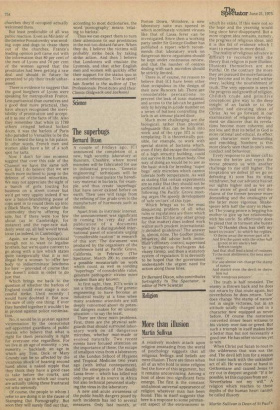Religion
More than illusion
Martin Sullivan
A relatively modern attack upon religion emanating from the world of psychology suggests that all religious feelings and beliefs are mere illusion. There are times when all of us who hold to some religion feel the force of this argument, but it remains unconvincing. Among a host of ideas two significant facts emerge. The first is the constant and almost universal appearance of religion wherever man has been found. This in itself suggests that here is a response to some permanent aspect of the environment in
which he exists, If this were not so the hope and the yearning would long since have disappeared. But a more cogent idea remains, namely, the progress of religious ideas, and it is this bit of evidence which I want to examine in more detail.
, The reality of religious advance is difficult to reconcile with the theory that religion is pure illusion. Illusions themselves are not fruitful. On the contrary the more they are pursued the more fantastic they become and in the end wither away, lacking the nourishment of truth. The very opposite is seen in the progress and growth of religion. Childish crude and primitive conceptions give way to the deep insight of an Isaiah or to the sublime and elevating ideas of Christ. As we go forward in our examination of religious development we discover that its revelations become more coherent and not less and that its belief in God is more rational and ethical, its effect upon character more demanding and ennobling. Nowhere is this more clearly seen than in one's own conduct and behaviour.
Every response to an inner call to choose the better and reject the worse presents us with another challenge to rise still higher. The temptation we defeat (if we go on defeating it) soon has its sting withdrawn, but our advance has set our sights higher and as we are more aware of good and evil the claims of the former become more demanding and the onslaughts of the latter more vigorous. Shakespeare tells half the story in Hamlet. The young prince is begging his mother to give up her relationship with his uncle. So effectively does he plead that in torment she bursts out: "0 Hamlet thou has cleft my heart in twain", to which he replies,
'0 throw away the worser part of it And live the purer with the other half ... go not to my uncle's bed ... Refrain tonight And that shall lend a kind of cosiness To the next abstinence, the next more easy; For use almost can change the stamp of nature And master even the devil, or throw him out With wondrous potency'.
The truth is half revealed. The enemy is thrown back and he does not return by that route again, but nevertheless he does return. 'Use' does change 'the stamp of nature' not in single victories, but in an attitude totally changed and in a character now equipped as never before. Of course the notorious converted sinner bears witness to his victory over lust or greed. But such a triumph in itself makes him a better man but not necessarily a good one. He has other victories yet to win.
When Christ put Satan to rout in, the wilderness that was not the end. The devil left him for a season but came back with the unkindest act of all. He was close at hand in Gethsemane and caused Jesus to cry out in deepest anguish "If it be possible, let this cup pass from me . • • Nevertheless not my will." A religion which reaches to these depths of the human heart cannot be called illusory.
Martin Sullivan is Dean of St Paul's'


































 Previous page
Previous page